- Home
- Chris Ryan
One Good Turn Page 2
One Good Turn Read online
Page 2
Stubbs reached the end of the tunnel, skidded round the corner and ran straight into the biggest man he had ever seen. He bounced off him and fell into the gutter, knocking his knee.
'WHOA THERE!'
Stubbs felt a large hand grab his collar, lift him in the air as if he were a child and put him down. The man was dressed in khaki, had three stripes on his arm and a large moustache.
'Let me go, let me go! They're after me!'
'All right, son. The army's here.'
'I can't move!' Stubbs shouted. 'You've crippled me, you great ox!'
'Crippled you, have I?' the giant said. 'We'll just have to see about that. Your luck is in because just across the road are some of the most skilled doctors in all the land. Let's just pop in there and get you sorted out, young man. Don't worry. We'll look after you.'
Stubbs felt himself pushed across the street and into a dark office where a man in khaki uniform was sitting at a low table.
He looked around. There were posters on the wall — YOUR COUNTRY NEEDS YOU.
'I'm not signing up,' Stubbs squeaked.
The huge sergeant stood back from the doorway he had been blocking. Outside, half a dozen Chinese sailors were standing in a group, pointing and shouting. A couple of them were waving long knives with wicked blades.
'Your choice, sonny,' he said. 'You can sign up or you can go out there and take your chances.'
'But they'll slice me up,' Stubbs said.
'They do seem rather angry. I'm afraid I don't speak their lingo so I can't reason with them. As I said, it's your choice: go out there or stay with us. Remember, the army looks after its own. If you volunteer, I'll see to it that you end up doing something that suits your particular skills. Let's see now. What would you think about a nice job in supplies? Maybe we could get you sorting out the rum ration. That's an important job. You might never even have to leave England. You might even stay here in London. What do you say, chum? A soft life for the next few years — or a Chinese knife in your guts?'
So Stubbs signed.
The first lesson Stubbs learned was that the army was as full of liars as Civvy Street — and the biggest liar of them all was the sergeant who had recruited him.
Three months training in a hellhole in the Welsh countryside taught him the ropes. He learned how to drill on a parade ground, shoot a rifle, bayonet a scarecrow. But most of all, he learned that that whatever people said about teamwork, in the army it was every man for himself.
He started a little boot- and buckle-shining business which went quite well until the military police found out about it and kicked the living daylights out of him. After that, he made sure they were cut in on all his scams — which grew to include the illegal sale of tobacco, whisky and pornographic postcards brought back from France.
All that came to an end when he was sent to war. He spent two days on a train, half a day on a boat and then another day on a train. If he'd paid any attention at all, he would have known that he was going to the Bullring: the huge training camp at Etaples where the recruits were knocked into shape by the Canaries — a staff of sadists and bullies.
John Stubbs got off the train and took stock. Even at six in the morning, the place was a sea of khaki. Men were being herded into lines ready to be marched off to the camp which was a mass of tents that stretched as far as the eye could see.
He sidled up to one of the guards who were there to stop the soldiers legging it down the railway lines.
'Busy day?' he asked.
The guard spat. 'Not really. Bit quiet actually.'
'Like this all the time, is it?'
'More or less.'
So, Stubbs thought, hundreds of men are arriving every hour. They've got to be going somewhere.
It didn't take a great deal of intelligence to work out where.
They were going to the front, where they were replacing the men who were being killed at the rate of hundreds an hour.
So Stubbs decided to stay put.
He quickly learned that the Bullring was in fact a series of training grounds. Each one was surrounded by a city of sleeping tents, mess halls, kitchens, storehouses and depot tents. Each one used hand-painted road signs like those on the streets at home.
For the first week, Stubbs thought he would never find his way around. He was moved from one regiment to another, then back to his original one without anyone noticing that he had gone in the first place. No one cared. They just concentrated on making sure that within six weeks soldiers left the camp, ready to kill or be killed.
They did this by making the place as hellish as possible. Exercises took place with live ammunition and real hand grenades. After each exercise, stretcher-bearers took the injured away to the many field hospitals and casualty clearing stations that lay behind the lines.
By day ten at the Bullring, Stubbs had already seen one man put his bayonet through his best friend's thigh. Another blow his hand off while assembling a Mills bomb, one of the pineapple-shaped hand grenades that had just been developed.
He knew it was time to take action.
The only way to get out of the grinding, punishing routine was to go sick. People devised the most ingenious methods, such as stuffing their boots with blotting paper to make themselves faint on parade, or eating sour milk or old meat to mess up their guts. Some men even shot themselves, though this was dangerous. First, if the wound got infected, you might lose a limb or die. Secondly, if the military police suspected you had shot yourself, you would be court martialled for cowardice.
Stubbs knew that hundreds of thousands of tons of food, weapons, ammunition, clothing and machinery passed through the French countryside right under his nose.
Controlling the movement of all this stuff were the quartermasters, or Q Division. They were a section of the British Army whose job was to make sure the wheels of war kept rolling. Stubbs also knew that Q Division did not have access to medical supplies. And that was the chance he needed.
One morning he made sure he was first in line to see the medical orderly or MO. The MO sat behind a wooden trestle table, while a nurse stood at a table nearby, checking pills in a medicine cabinet.
Stubbs stood in front of the table and came straight to the point. 'I need some time to myself,' he said quietly. 'What's the best you can do for me?'
'I beg your pardon. What do you mean.?..'
Stubbs leaned across the table and, putting venom in his voice, he whispered: 'I know what you've got hidden at the bottom of your kitbag in your quarters, sir, and it's not postcards of the royal family.'
A few days ago he had been on cleaning duties in the officers' quarters and had taken the trouble to do some snooping. When he found the pictures of naked boys sunning themselves by the sea, he knew they would come in useful.
'That'll be all, nurse!' the doctor blurted out. He was a young man with serious eyes behind his round, hornrimmed glasses.
'Sir?' the nurse said.
'Embarrassing problem with this one, nurse. Won't let me look at him with a lady in the room.'
'But sir, I've...'
'I know, I know, but just to make things move along.' As soon as she'd gone, he said: 'What do you mean?'
Stubbs smiled. 'I don't care if you like looking at pictures of little foreign boys sir, but I think I know what the brigadier calls it. Beastliness. Tut, tut. They shoot people for less.'
'But they're art!' the doctor said. They're beautiful!'
'They're illegal, sir. I know because I used to deal in them. Now, here's what I want.'
Two minutes later Stubbs had been bought off with the promise of a supply of morphine and a note, which said he had a broken rib and needed time off for it to heal.
Then he started work in earnest.
For two days, he waited. On the third he had got his man: a corporal working in the quartermasters' HQ. The corporal visited certain shops and officers' messes once in the morning on foot, and once in the afternoon with a supply wagon and a team of two horses.
>
He was taking orders in the morning and filling them in the afternoon, Stubbs thought. And from the way cash changed hands, he was sure that he was seeing stolen goods being sold through the black market.
On the fourth day, Stubbs waited for the wagon to slow down on a muddy slope and hopped onto it.
'Who the bloody hell are you?' the corporal said. He looked well fed and soft, to Stubbs. His yellow armband showed he was on the staff.
'I'm Private Desperate, that's who I am,' Stubbs said.
'Well, go and be desperate somewhere else,' the corporal replied, 'or you'll get a visit from my mates and then you really will be sorry.'
'I don't think so,' Stubbs said. 'Because I've got something you want.'
'What's that?'
'Morphine.'
'Why do you think I want morphine?' the man asked.
'Because this is hell,' Stubbs said. 'And people want out. Take morphine like the Chinese sailors take it, and you're wherever you want to be. I know you. I've been watching. Get me a soft bed, get me a yellow armband and you and me can really go places. I reckon morphine's the one thing you boys can't get hold of and, funnily enough, it's the one thing I can.'
When Stubbs was at school, there was one Latin phrase he learned between his frequent beatings: carpe diem. Seize the day, it meant. Or as his old grandmother used to say: nothing ventured, nothing gained.
Two days later, Stubbs was the personal servant of a Captain D'Arcy, whose full name was Lord Frederick Arthur D'Arcy. D'Arcy was hugely rich, as thick as a plank and a morphine addict. To be honest, Stubbs reckoned, the more drugs he took, the better it was for all concerned. God help the British Army if that joker ever got off his camp bed, and tried to do his bit for King and Country.
Stubbs's cushy job lasted two months. As long as his supply of morphine was there, he was left alone. But as soon as it dried up, it was all over. As demand for morphine increased, so the pressure on the doctor grew and in time he snapped. Instead of committing suicide, he gave up his job in the training camp and volunteered for the next best thing: to become attached to an infantry battalion on its way to the front for the next big push.
Without his supply of morphine, Stubbs's pet officer became very ratty. One day he woke up to find Stubbs going through his private letters, and it dawned on him that certain family heirlooms had gone missing recently. Now he came to think of it, this began when his new batman had arrived.
Captain D'Arcy was not a man to make a fuss, but he had gone to the right school and he knew the right people. That very day Stubbs was sent back to his old regiment. He was sent to the front with sixty pounds of kit on his back.
Chapter Three
Now the prisoner's court martial was out of the way, he had been allowed to wash. He had found that the whole of his back was burned, as if he had been out in the fields for too long without a shirt. In two patches, the burning was more serious and his blisters covered raw flesh and pus.
A doctor had come in, taken a quick look at the weeping wounds and put a dressing on them. The prisoner knew why he hadn't taken more care: a firing squad was going to shoot him the morning after next. There was no point in wasting dressings on a man who was about to die, when there were men who could be saved elsewhere. Proper men. Proper heroes. Men who deserved to live.
The prisoner had also been unchained. He had moved an old chest, so that he could stand on it, underneath the broken airbrick. The light fell on his face and made him feel alive. And he liked trying to make out what the sounds were in the street outside: the rolling crunch of wagon wheels, the steady tramp of men marching, the murmur of French, the rare sound of birds.
Take two, do, take two. Take two, do, take two.
That was a woodpigeon.
Teacher, teacher, teacher.
That was a great tit.
All of a sudden he heard a voice in his head. 'And the yellowhammer, he goes: a little bit of bread and no cheese.'
That was his father.
A picture, as clear as day, appeared in his mind. His father was talking to him at the ford by the big gate onto the moor. He loved the ford when he was little, loved the way the brown, peaty water curled around the stones and washed away the mud of the sheep and cattle.
Dartmoor. That was it. He was from Dartmoor, and his father had a small farm on the edge of the moor outside the village of Lydford. They had a flock of sheep, a few cows and a couple of Dartmoor ponies because his mother loved them.
The memories lit up the prisoner's mind like a shaft of golden sunlight. They were almost too vivid to bear. He could see his mother making clotted cream to sell to the hotel down by the station; and himself, as a boy, dipping his fingers through the crust when she wasn't looking and letting the velvety taste melt on his tongue and slip down his throat. He remembered saddling up Mouse, his own pony which he had hand-reared, and riding out for long days on the moor, and he heard the curlews calling from the valleys and saw the rooks and the buzzards circling overhead.
He remembered the harsh winters, wading thigh-deep through the snow to feed the cattle and check on the sheep. He remembered taking the job in the squire's stables where he mucked out, and helped look after the two great hunters the squire kept. Castor and Pollux they were called, and there weren't two other horses like them in Devon.
He was sixteen when the war started. Everyone had a father, a brother, an uncle or a friend who was caught up in it. But when the army started recruiting in Tavistock, the nearest town, his mother wouldn't let him go. The squire said the same thing when he caught the boy moping behind the stables and asked what the matter was.
'Don't be such a bloody idiot,' he snapped. 'War is war and to be avoided at all costs. I lost my brother in South Africa. Know how he died?'
'A Zulu warrior?' the boy asked hopefully.
'No.'
'A Boer?'
'No. Nor was it the Queen of Sheba. It was dysentery. Do you know what he was doing? He was running a place called a concentration camp and the dysentery swept through it. And who was in the camp? Boer women and Boer children: held there so the army could burn their farms and shoot their animals. That's war,' the squire said. 'Only a fool wants to fight.'
'But I want to do my bit. I want to have a go at the Hun.'
'A few years ago the Hun was your brother,' the squire growled. 'Prince Albert, our own King's father, was a bloody Hun. The Queen was a bloody Hun. The bloody King's a bloody Hun, if you ask me.' He stormed off, hitting the nettles with his walking stick. 'They're all bloody Huns!'
This had just left him even more miserable. How could he not fight when so many others of his age were joining the Devonshire Regiment? And what would it be like when they came home and found him still there, with straw in his hair and muck under his nails? The squire was bitter. That was all. For him it would be different.
He had left his sleeping parents with a loving goodbye note and had taken the 5.45 morning train from Lydford to Exeter. There he quickly found a recruiting station.
'How old are you, sonny?' the sergeant had asked.
'Seventeen, sir,' the prisoner had replied.
'Well, walk to the cathedral and back. By that time you'll be eighteen and old enough to enlist,' the sergeant had said with a wink.
All went smoothly. Training camp in the north of England was not very pleasant, until the drill sergeant discovered that he had a way with horses. Then everything changed.
In the old days when you joined the army, it was said that you took the King's Shilling. It was a joke these days that a horse was worth more than a man, because a man might cost a shilling but a horse could cost anything up to £40. Every week, gypsy traders would drive their horses to the camp to sell them. The prisoner was standing by the ring one day while an officer was trying to choose a mount. He looked from the outside of the ring and eventually pointed to a lively bay with a blaze on its forehead.
The prisoner could not believe his eyes, so much so that he ran up to the officer
and blurted out: 'You can't buy that!'
The horse trader looked daggers at him. 'This is a fine horse,' he said. 'I've never seen the like and this gentleman is clever enough to spot it.'
'He's lame in the back leg. He's got no wind and his mouth's cut to ribbons, which means someone's tried to control him but failed. That's the best one in the ring,' he said, pointing to a quiet chestnut horse. 'He's strong and steady, but don't pay a penny over twenty quid for him.'
After that, he worked with horses and was happy.
Three weeks later he was in France, with the Artillery Brigade of the 7th Division.
The artillery couldn't work without horses. One of the horses' most important duties was to pull the field guns into position and keep them supplied with shells. As a good six-man gun crew could fire twenty rounds a minute for hours, the riders were kept busy bringing a supply of shells from the ammo dumps.
And it was true: the horses, wherever possible, were treated better than the men. They were stabled back from the lines, away from the worst of the German artillery fire; they did not live up to their knees in muddy water. And unlike a soldier, unless he was a high-ranking officer, each horse was looked after by a team of grooms and riders, who cared deeply for their animals.
The prisoner thought back to an event in July that summer, not so long ago. It was before the rains came, and the weather had been good. There had been rumours that the army was going to make a big push into Ypres, but no one took it seriously. He was experienced by then, but most of his work had been moving guns and ammunition behind the lines.
One morning, however, his sergeant, who was another Devon man called Sid Mitchell, had beckoned him over.
'Last night they moved four sections of B Battery forward,' Mitchell said grimly. 'They've been shot up badly and it's up to the lads of A Battery to keep them supplied.'
'What's the problem?' he asked. 'I mean, why is it worse than anything else?'
'Well, it's like this,' Sergeant Mitchell said. 'Our position is very exposed. All through the war, we've managed to keep hold of a sort of bulge that cuts into the enemy line. But here's the problem, son. This bulge is surrounded on three sides by enemy-held hills. That means our German chums can sit up there, bomb the hell out of us and we just have to take it. We've tried everything. We even dug under one of those hills and blew the whole thing up with 91,000 pounds of high explosives. The Prime Minister heard the explosion in Downing Street but even that hasn't changed things. You still cannot move in that bulge without a German on a hill seeing you and shooting at you with a rifle, or a cannon, or a howitzer. They specially like shooting at artillery trains. Are you ready for it, mate?'

 Global Strike
Global Strike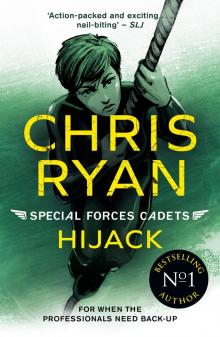 Hijack
Hijack Special Forces Cadets 2
Special Forces Cadets 2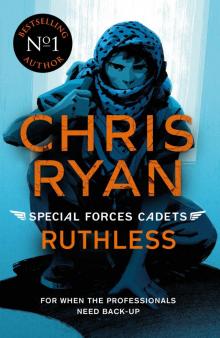 Ruthless
Ruthless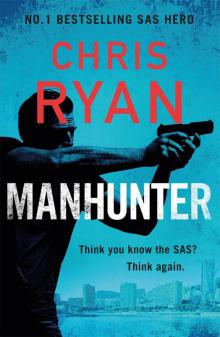 Manhunter
Manhunter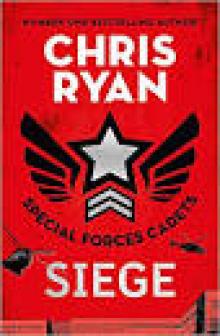 Special Forces Cadets 1
Special Forces Cadets 1 Red Strike
Red Strike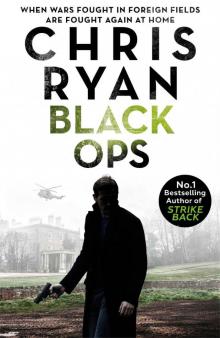 Black Ops
Black Ops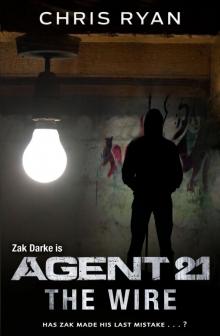 Agent 21: The Wire
Agent 21: The Wire Land of Fire
Land of Fire Alpha Force: Fault Line
Alpha Force: Fault Line Under Cover (Agent 21)
Under Cover (Agent 21) Endgame (Agent 21)
Endgame (Agent 21) Red Centre
Red Centre Blackout
Blackout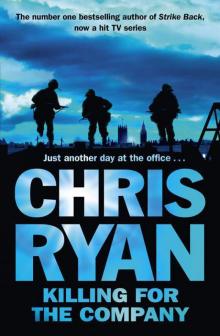 Killing for the Company
Killing for the Company The Watchman
The Watchman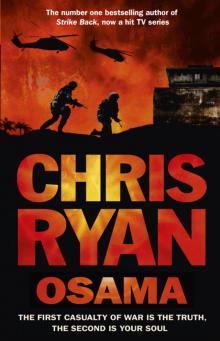 Osama
Osama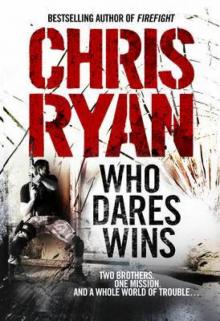 Who Dares Wins
Who Dares Wins The Kremlin Device
The Kremlin Device Hunter Killer
Hunter Killer Alpha Force: Untouchable
Alpha Force: Untouchable Stand By Stand By
Stand By Stand By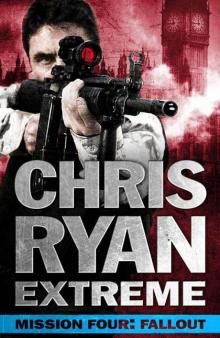 Chris Ryan Extreme: Hard Target: Mission Four: Fallout
Chris Ryan Extreme: Hard Target: Mission Four: Fallout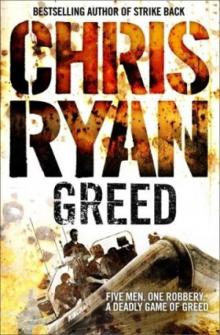 Greed mb-1
Greed mb-1 Alpha Force: Desert Pursuit
Alpha Force: Desert Pursuit Strike Back
Strike Back Greed
Greed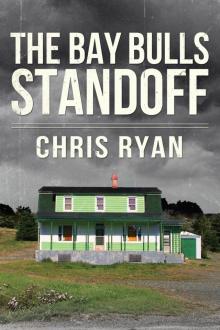 The Bay Bulls Standoff
The Bay Bulls Standoff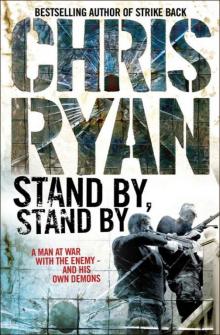 Stand By, Stand By gs-1
Stand By, Stand By gs-1 Outbreak
Outbreak Hunted
Hunted Vortex cr-4
Vortex cr-4 Rat-Catcher
Rat-Catcher Vortex
Vortex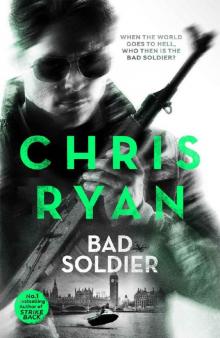 Bad Soldier
Bad Soldier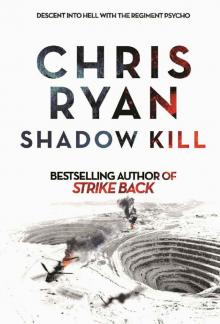 Shadow Kill: A Strikeback Novel
Shadow Kill: A Strikeback Novel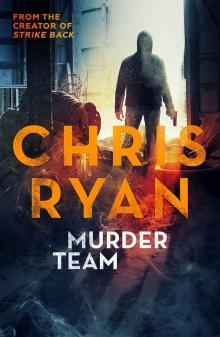 Murder Team (Kindle Single)
Murder Team (Kindle Single) One Good Turn
One Good Turn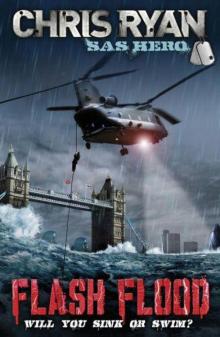 Flash Flood cr-1
Flash Flood cr-1 Night Strike
Night Strike Wildfire
Wildfire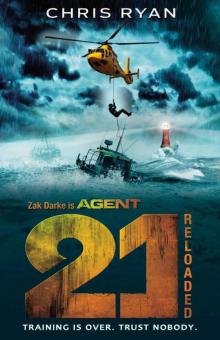 Agent 21: Reloaded: Book 2
Agent 21: Reloaded: Book 2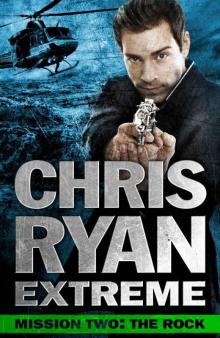 Chris Ryan Extreme: Hard Target: Mission Two: The Rock
Chris Ryan Extreme: Hard Target: Mission Two: The Rock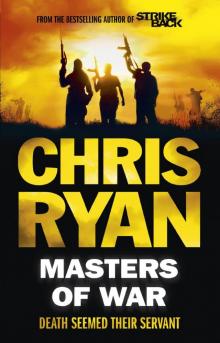 Masters of War
Masters of War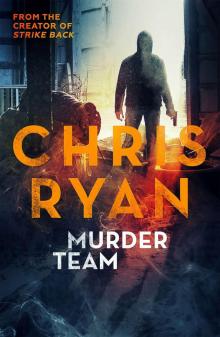 Murder Team
Murder Team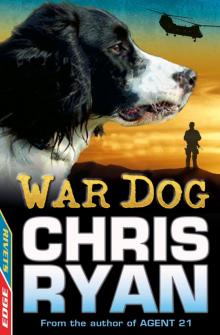 War Dog
War Dog Wildfire cr-2
Wildfire cr-2 Survival
Survival The One That Got Away - Junior edition
The One That Got Away - Junior edition The Hit List
The Hit List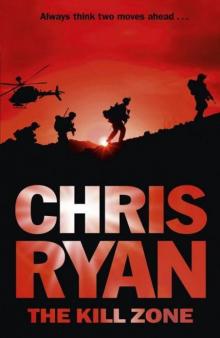 The Kill Zone
The Kill Zone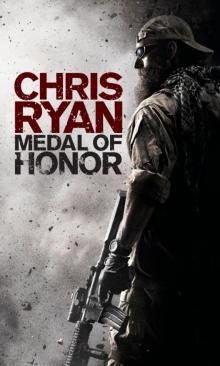 Medal of Honor
Medal of Honor Battleground
Battleground Twister
Twister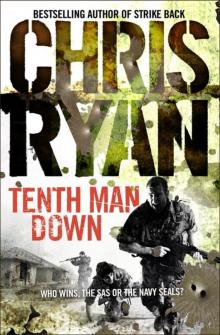 Tenth Man Down gs-4
Tenth Man Down gs-4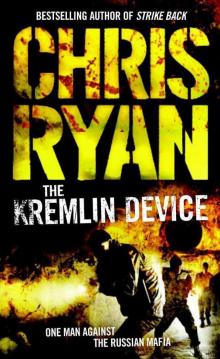 The Kremlin Device gs-3
The Kremlin Device gs-3 Hostage
Hostage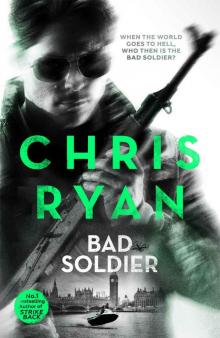 Bad Soldier: Danny Black Thriller 4
Bad Soldier: Danny Black Thriller 4 Alpha Force: Blood Money
Alpha Force: Blood Money Firefight
Firefight Chris Ryan Extreme: Hard Target: Mission One: Redeemer
Chris Ryan Extreme: Hard Target: Mission One: Redeemer Hit List
Hit List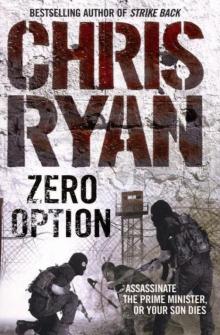 Zero Option gs-2
Zero Option gs-2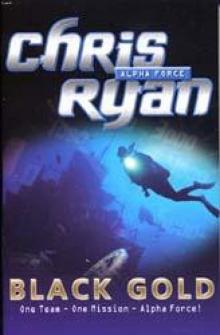 Black Gold
Black Gold Agent 21: Codebreaker: Book 3
Agent 21: Codebreaker: Book 3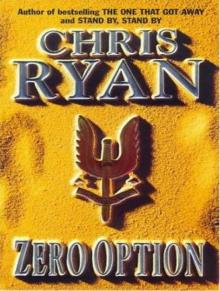 Zero Option
Zero Option Ultimate Weapon
Ultimate Weapon Tenth Man Down
Tenth Man Down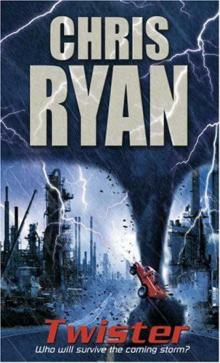 Twister cr-5
Twister cr-5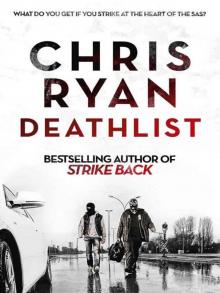 Deathlist
Deathlist Hellfire
Hellfire Flash Flood
Flash Flood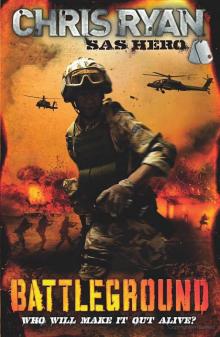 Battleground cr-6
Battleground cr-6 The Increment
The Increment